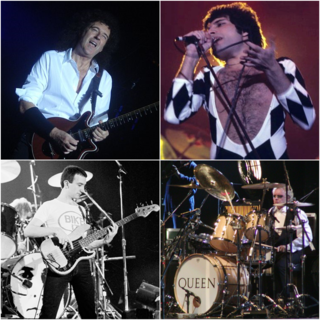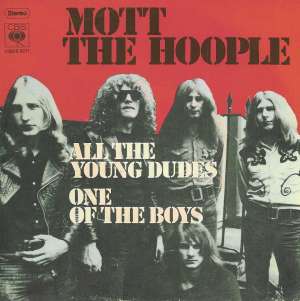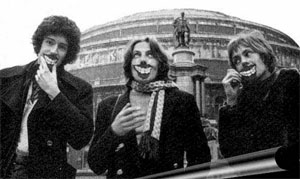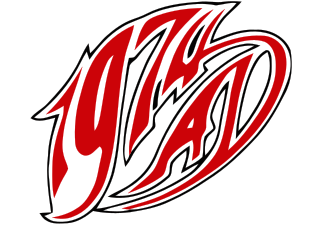
King Crimson are an English progressive rock band formed in London in 1968. King Crimson have been influential both on the early 1970s progressive rock movement and numerous contemporary artists. The band has undergone numerous formations throughout its history, of which 22 musicians have been members; since October 2017 it has consisted of Robert Fripp, Jakko Jakszyk, Tony Levin, Mel Collins, Pat Mastelotto, Gavin Harrison, Jeremy Stacey and Bill Rieflin. Fripp is the only consistent member of the group and is considered the band's leader and driving force. The band has earned a large cult following. They were ranked No. 87 on VH1's 100 Greatest Artists of Hard Rock. Although considered to be a seminal progressive rock band, they have often distanced themselves from the genre: as well as influencing several generations of progressive and psychedelic rock bands, they have also been an influence on subsequent alternative metal, hardcore and experimental/noise musicians.

Queen are a British rock band formed in London in 1970. Their classic line-up was Freddie Mercury, Brian May, Roger Taylor, and John Deacon. Their earliest works were influenced by progressive rock, hard rock and heavy metal, but the band gradually ventured into more conventional and radio-friendly works by incorporating further styles, such as arena rock and pop rock.

The Eagles are an American rock band formed in Los Angeles in 1971. The founding members were Glenn Frey, Don Henley, Bernie Leadon and Randy Meisner. With five number-one singles, six Grammy Awards, five American Music Awards, and six number-one albums, the Eagles were one of the most successful musical acts of the 1970s. At the end of the 20th century, two of their albums, Their Greatest Hits (1971–1975) and Hotel California, were ranked among the 20 best-selling albums in the United States according to the Recording Industry Association of America. By 2006, both albums were among the top three best-selling albums in the United States. Hotel California is ranked 37th in Rolling Stone's list of "The 500 Greatest Albums of All Time" and the band was ranked number 75 on the magazine's 2004 list of the 100 Greatest Artists of All Time.

Mott the Hoople are an English rock band with strong R&B roots, popular in the glam rock era of the early to mid-1970s. They are best known for the song "All the Young Dudes", written for them by David Bowie and appearing on their 1972 album of the same name.

Blondie is an American rock band founded by singer Debbie Harry and guitarist Chris Stein. The band was a pioneer in the early American new wave and punk scenes of the mid-late 1970s. Its first two albums contained strong elements of these genres, and although successful in the United Kingdom and Australia, Blondie was regarded as an underground band in the United States until the release of Parallel Lines in 1978. Over the next three years, the band achieved several hit singles including "Heart of Glass", "Call Me", "Rapture" and "The Tide Is High" and became noted for its eclectic mix of musical styles incorporating elements of disco, pop, reggae, and early rap music.

Queen II is the second studio album by the British rock band Queen. It was released on 8 March 1974 by EMI Records at midnight in the UK and by Elektra Records in the US. It was recorded at Trident Studios and Langham 1 Studios, London from February to August 1973 with co-producers Roy Thomas Baker and Robin Geoffrey Cable, and engineered by Mike Stone.

The Steve Miller Band is an American rock band formed in 1966 in San Francisco, California. The band is led by Steve Miller on guitar and lead vocals. The group is best known for a string of (mainly) mid- to late-1970s hit singles that are staples of classic rock radio, as well as several earlier psychedelic rock albums. Miller left his first band to move to San Francisco and form the Steve Miller Blues Band. Shortly after Harvey Kornspan negotiated the band’s contract with Capitol Records in 1967, the band shortened its name to the Steve Miller Band. In February 1968, the band recorded its debut album, Children of the Future. It went on to produce the albums Sailor, Brave New World, Your Saving Grace, Number 5, Rock Love and more. The band's Greatest Hits 1974–78, released in 1978, sold over 13 million copies. In 2016, Steve Miller was inducted as a solo artist in the Rock and Roll Hall of Fame.

"Killer Queen" is a song by the British rock band Queen. It was written by lead singer Freddie Mercury and recorded for their third album Sheer Heart Attack in 1974. It was their first international hit, reaching number two in the UK and becoming their first US hit. The song is about a high-class call girl and has been characterised as "Mercury's piano-led paean to a Moët-quaffing courtesan".

"Waterloo" is the first single from the Swedish pop group ABBA's second album, Waterloo and their first under the Epic and Atlantic labels. This was also the first single to be credited to the group performing under the name ABBA.

"All the Young Dudes" is a song written by David Bowie, originally recorded and released as a single by Mott the Hoople in 1972. In 2004, Rolling Stone rated "All the Young Dudes" No. 253 in its list of The 500 Greatest Songs of All Time and on its 2010 update was ranked at number 256. It is also one of the Rock and Roll Hall of Fame's 500 Songs that Shaped Rock and Roll.

Smile were an English rock band based in London, best known as the predecessor to renowned rock band Queen. The band was formed in 1968 by Brian May, who went on to become Queen's guitarist. It included Tim Staffell as lead singer and bass guitarist, and later, drummer Roger Taylor, who also went on to play for Queen. They recorded only six songs and disbanded in 1970. These songs were titled “April Lady”, “Step on Me”, “Polar Bear”, “Earth”, “Blag”, and a song later re-recorded by Queen for the Queen album of 1973, “Doin’ Alright”. These songs exist on vinyl on the LP Ghost of a Smile. "April Lady" was dedicated to Roger Taylor’s girlfriend at the time.

"Jet" is a song by Paul McCartney and Wings from their album Band on the Run. It was the first British and American single to be released from the album. The song's title was inspired by McCartney's jet-black Labrador.

"It's Only Rock 'n Roll " is the lead single from English rock band the Rolling Stones' 1974 album It's Only Rock 'n Roll. Writing is credited to Mick Jagger and Keith Richards and the single reached the top ten in the UK charts and top 20 in the United States.
The English rock band Queen was well known for its live musical acts. Diverse musical catalogues, large sound systems, lighting rigs, innovative pyrotechnics and extravagant costumes often gave shows a theatrical nature. Artists such as Bob Geldof, David Bowie, George Michael, Kurt Cobain, and Robbie Williams have expressed admiration for lead singer Freddie Mercury's stage presence.
"Tiger Feet" is a popular song by the English glam rock band Mud, released in January 1974. Written and produced by the songwriting team of Mike Chapman and Nicky Chinn, it was the band's first number No. 1 single in the UK Singles Chart.

"Rock'n Roll Band" is a song by Swedish pop group ABBA from the album Ring Ring.

The Ramones were an American punk rock band that formed in the New York City neighborhood of Forest Hills, Queens, in 1974. They are sometimes cited as the first true punk rock group. Despite achieving only limited commercial success, the band was influential in the United States and the United Kingdom.

The Queen II Tour was a concert tour by British rock group Queen to promote their 1974 album Queen II. It was the second major tour by the group and started only a month and a half after the end of the Queen I Tour. The band visited major cities in the UK and also went on to tour the United States, supporting Mott the Hoople. The band had to cancel all other concerts after 12 May 1974 as guitarist Brian May contracted hepatitis.















